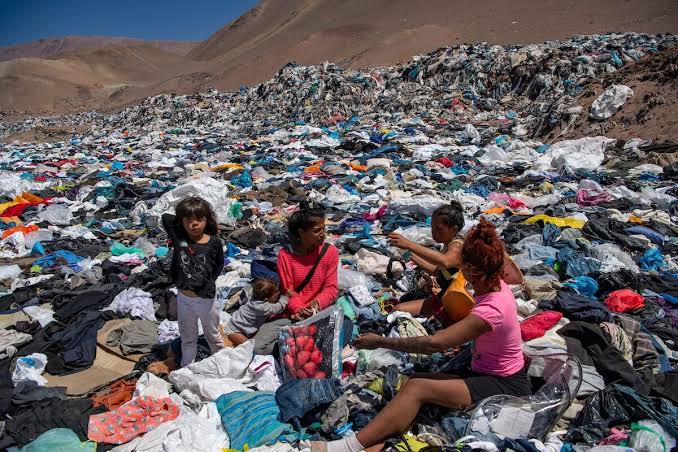What Is Fast Fashion And Why Is It So Bad?
Fast fashion represents the rapid translation of design trends into multi-batch clothing collections. As a modern phenomenon, it has revolutionized the way consumers engage with the fashion industry, offering runway-inspired styles at a fraction of the cost and speed. This sector, known for its accelerated production cycles, caters to the dynamic shift in fashion trends fueled by digital influencers and changing consumer preferences.

A mountain of unused fast fashion clothing items in the Atacama Desert in Chile has grown so large that satellites have captured clear images of it.
However, the allure of fast fashion comes at a cost, both ethically and environmentally. The industry’s reliance on rapid production often results in garments with a lifespan as fleeting as 7 to 10 wears. This ephemeral quality not only questions the material value of the products but also contributes to significant environmental degradation. The fashion industry’s carbon footprint is substantial, accounting for 10% of annual global emissions, with production rates having doubled since the turn of the millennium.
In an effort to keep production costs minimal, fast fashion frequently resorts to synthetic materials like polyester, derived from nonrenewable petroleum and notorious for its enduring presence in landfills. Moreover, the industry’s workforce, which is estimated at 75 million globally, often operates under precarious conditions, with a meager 2% earning a living wage.
The bulk of apparel manufacturing is outsourced to countries where labor is inexpensive, regulatory oversight is lax, and, regrettably, child labor exploitation is more prevalent. These practices, while trimming production costs, carry ethical implications that cannot be ignored and are increasingly scrutinized by consumers and environmental advocates.
Despite the challenges, there are pathways to a more sustainable and ethical fashion industry. These include adopting natural, long-lasting fibers, supporting fair labor practices, and fostering a consumer culture that values quality over quantity. Such efforts necessitate a collective commitment from manufacturers, designers, and consumers alike to transform the fashion landscape into one that is as conscious of its environmental and social impact as it is of style and trends.
In conclusion, while fast fashion has democratized style and kept pace with the digital age’s voracious appetite for novelty, it is imperative to confront the underlying issues it poses. By advocating for sustainable practices and ethical production, the industry can evolve to meet the demands of the modern consumer without compromising the health of our planet or the dignity of its workers.

Ntianu Obiora is a versatile creative professional with over a decade of experience in publishing, marketing, communications, and digital strategy. She is the Online Editor at THEWILL DOWNTOWN






